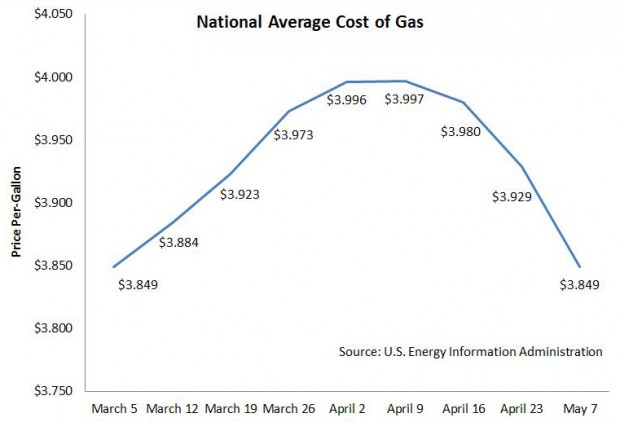
Gas prices declined this spring, but have been rising since early July
Scott Detrow / StateImpact Pennsylvania


Gas prices declined this spring, but have been rising since early July
Scott Detrow / StateImpact Pennsylvania

Scott Detrow / StateImpact Pennsylvania
Gas prices declined this spring, but have been rising since early July

Scott Detrow / StateImpact Pennsylvania
Gas prices may have peaked for the year
You may have already paid your highest gasoline bill for the year. Thank a stabilizing Middle East and a Philadelphia refinery sale for that fact.
The average national cost of gas is back where it was on March 5th. The per-gallon price peaked at just under $4 in early April, but has been steadily declining ever since.
In fact, many experts are confident the cost of a gallon has already peaked for the year. National prices have dropped more than a dime, to $3.849, compared to last month’s levels. In Pennsylvania, the average price of a gallon has dropped from $3.977 to $3.784 since early April.
Both global and local factors have contributed to the retreat, according to Tom Kloza, the chief analyst for the Oil Price Information Service. The main driver, Kloza said, is declining crude oil prices. That’s due to “less of a threat that something will blow up in the Middle East, most notably Iran,” Kloza explained, pointing to weeks of headlines about a possible military or diplomatic confrontation with the country as a major factor for prices approaching $4-a-gallon in March and April.

The average cost of gas is back where it was in early March” credit=”
Kloza said the decline is a recognition that market experts “overreacted to the up-side…reacted to people who predicted $5 gasoline. …The only way that happens is some sort of untoward event in the Middle East or Gulf Coast.”
Averting a war with Iran affects gasoline prices, but reopening a Philadelphia-area gasoline refinery does, too. “There’s a bit of a Lazarus effect” to Delta purchasing ConocoPhillips’ Trainer oil refinery, which shut its doors last year.
The refinery has the capacity to process more than 180,000 barrels of oil a day, and while Delta’s main goal is to generate jet fuel, it will still produce gasoline with the goal of selling it on the market.
So a refinery experts had counted out will suddenly produce fuel again. On top of that, Sunoco announced it will, at minimum, delay the scheduled June shutdown of its Marcus Hook refinery as it searches for a buyer. The Sunoco plant processes a quarter of the East Coast’s gasoline, and Kloza had called its impending summer closure a “worst-possible scenario” for gas prices.
“At the very least, we’ve had a stay of execution for one of the largest refineries on the East Coast,” he said, “and a resurrection for a refinery we thought was gone forever.
Analysts predicting $5 gas had anticipated both plants would stay closed, and now that the doom-and-gloom refining picture is a bit sunnier, prices are dropping.
So, barring a hurricane disrupting Gulf Coast oil production, or a crisis in the Middle East, “most likely we’ve seen the high for the year,” Kloza said.
StateImpact Pennsylvania is a collaboration among WITF, WHYY, and the Allegheny Front. Reporters Reid Frazier, Rachel McDevitt and Susan Phillips cover the commonwealth’s energy economy. Read their reports on this site, and hear them on public radio stations across Pennsylvania.
(listed by story count)
StateImpact Pennsylvania is a collaboration among WITF, WHYY, and the Allegheny Front. Reporters Reid Frazier, Rachel McDevitt and Susan Phillips cover the commonwealth’s energy economy. Read their reports on this site, and hear them on public radio stations across Pennsylvania.
Climate Solutions, a collaboration of news organizations, educational institutions and a theater company, uses engagement, education and storytelling to help central Pennsylvanians toward climate change literacy, resilience and adaptation. Our work will amplify how people are finding solutions to the challenges presented by a warming world.